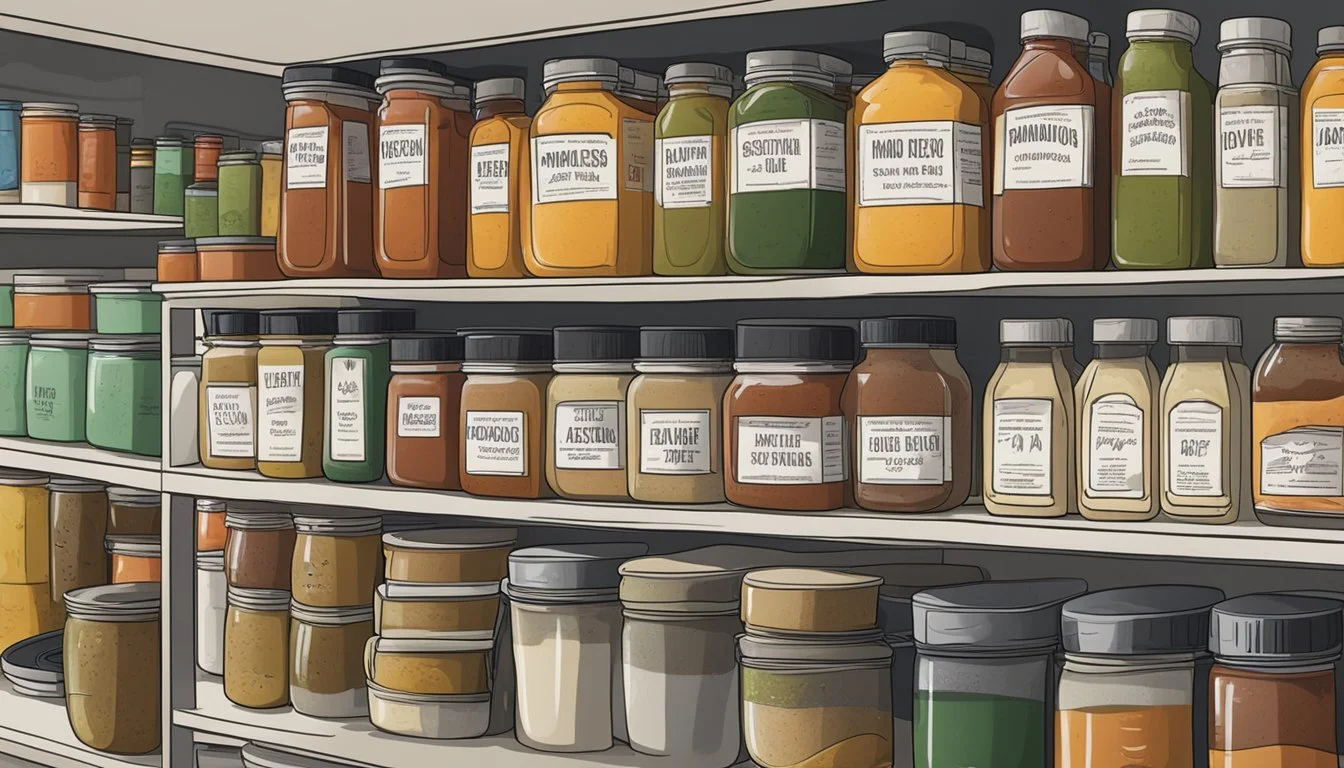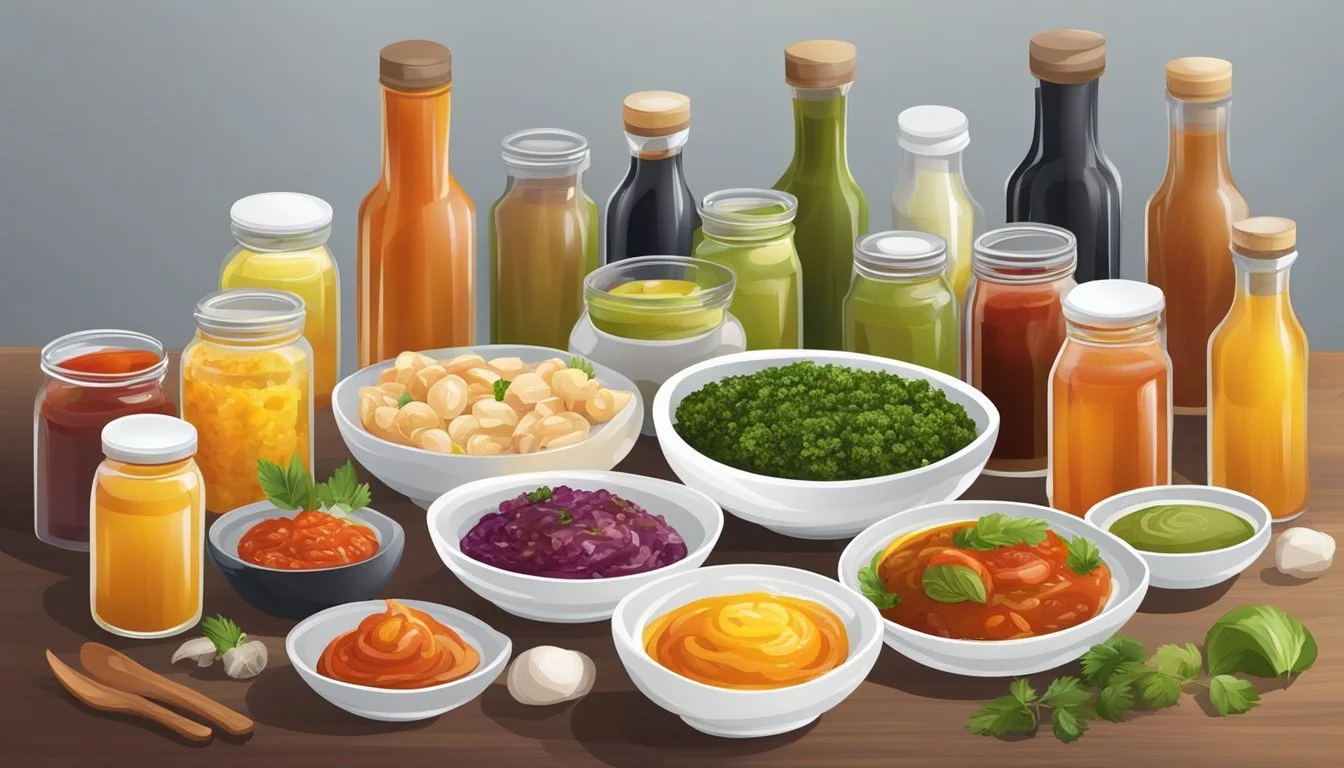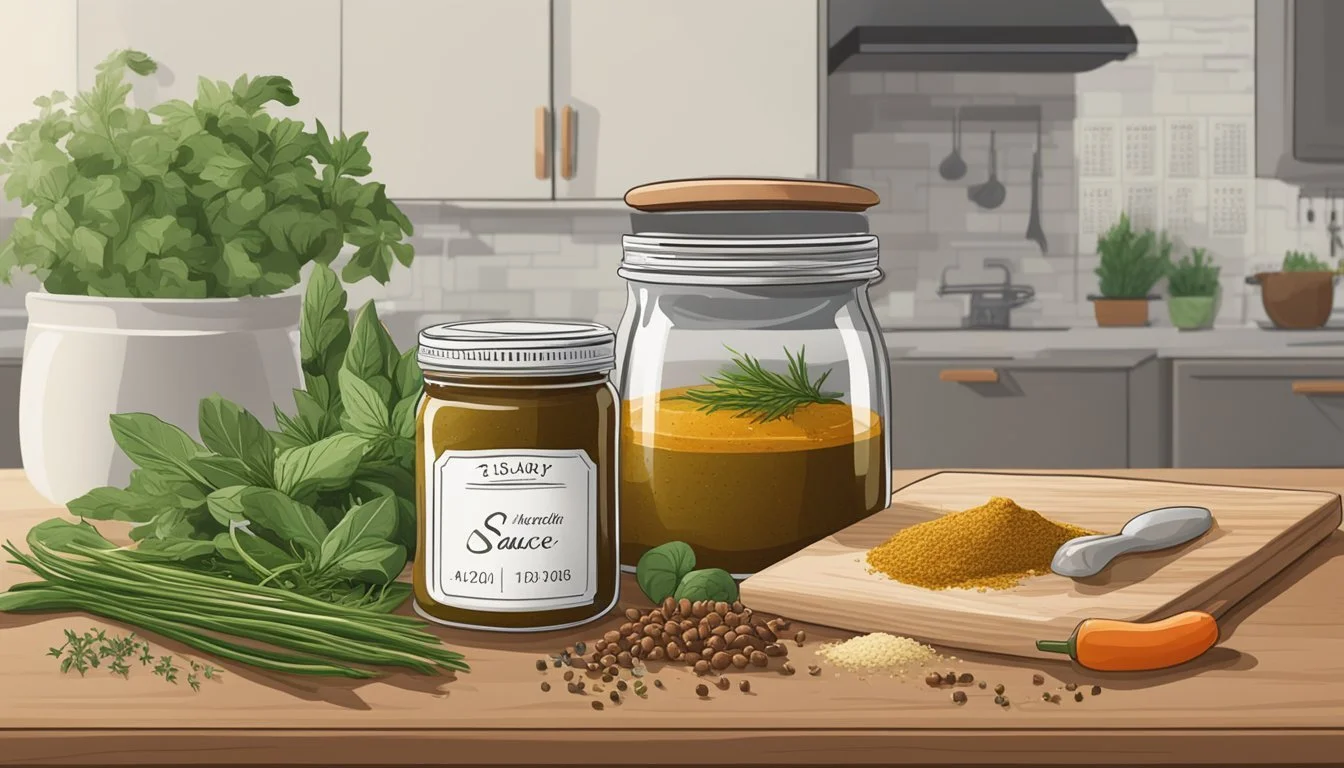How Long Do Fresh Marinades and Sauces Last?
Understanding Shelf Life and Storage Tips
Understanding the shelf life of fresh marinades and sauces (how long do fresh marinades and sauces last?) is essential for both safety and flavor. When it comes to homemade or freshly purchased marinades and sauces, they typically have a shorter shelf life due to the absence of preservatives found in commercially processed products. Fresh marinades, which often contain acidic ingredients such as vinegar or citrus juices, can last in the refrigerator for around five days, provided they're stored properly in airtight containers.
Commercially bottled sauces, by contrast, often have preservatives that extend their shelf life. Unopened, these can last several years at room temperature; once opened, their shelf life can range from a few months to a year when refrigerated, depending on their ingredients. For example, ketchup, a common condiment, can last for several months in the fridge even after opening, because of its high vinegar content and the natural preserving properties of ingredients like tomato and sugar.
Natural marinades and sauces without artificial preservatives have a more limited lifespan once opened. For instance, natural peanut butter can last at room temperature for a few months, but in the refrigerator, it may last several months longer. Hot sauce, noted for its spicy ingredients, can last up to six months in the pantry after opening, and even longer if stored in the fridge. Understanding the variables that affect the longevity of these products is key for both home cooks and culinary professionals looking to ensure the quality and safety of their dishes.
Understanding Food Preservation
When it comes to preserving marinades and sauces, several factors play crucial roles. Food preservation hinges heavily on the use of acids and preservatives, the application of appropriate temperatures, and the balance of moisture and sugar content.
Role of Acids and Preservatives
Acids such as vinegar and citrus in marinades serve as natural preservatives by lowering the pH and creating an environment less hospitable to bacteria. Preservatives in sauces may include salt and sugar, which both inhibit bacterial growth by drawing moisture out of the bacteria, thereby preserving the sauce.
Effects of Temperature on Food Safety
Temperature control is essential for the safety of both fresh marinades and sauces. Refrigeration at 40°F (4°C) or below is imperative for slowing bacterial growth. For instance, homemade marinara sauce will generally last five to seven days in the refrigerator, whereas commercial varieties can last up to ten days due to stabilizers and preservatives.
Importance of Moisture and Sugar Content
Moisture and sugar content are both pivotal in food preservation. High sugar content in sauces, like barbecue sauce, acts as a preservative by binding to water and inhibiting microbial growth. The moisture content, conversely, should be monitored as high levels can encourage bacterial growth. This delicate balance ensures the longevity and safety of sauces and marinades.
Fresh Marinades and Sauces Overview
Marinades and sauces enhance flavor and texture in culinary applications. Their freshness directly affects taste quality and food safety.
Defining Freshness
Freshness in marinades and sauces is characterized by the vibrancy of flavor and the integrity of ingredients. A fresh marinade typically includes acidic components such as vinegar or citrus juice, oils, and flavoring agents like herbs, garlic, and onions. These elements work together to infuse the food with desired tastes and aromas. Fresh sauces may contain similar flavorful ingredients, offering complementary notes to a dish.
Ingredients Impact on Shelf Life
The shelf life of fresh marinades and sauces is governed by their ingredients. Most homemade marinades and sauces contain perishable components that are prone to degradation, both in flavor and safety, over time.
Acidic elements like vinegar: Often preserve the mixture to some degree by inhibiting bacterial growth.
Fresh herbs and garlic: While they add complexity to the taste, they can also be the first to deteriorate, potentially spoiling the sauce or marinade.
Onions: Raw onions can introduce additional moisture, which may affect longevity.
Typically, fresh marinades and sauces last in the refrigerator for up to a week, although this can vary based on the specific ingredients and storage conditions.
Storage Guidelines and Tips
To ensure the freshness and safety of fresh marinades and sauces, one should follow precise storage methods.
Optimal Refrigeration Practices
When storing fresh marinades and sauces, it's imperative to keep them refrigerated at temperatures at or below 40°F. Under these conditions, homemade sauces can maintain quality for up to 3-4 days, while commercial sauces containing preservatives may last much longer. Shallow containers are recommended for cooling sauces quickly and evenly, reducing the risk of bacterial growth.
Labeling: Date all marinades and sauces before refrigerating to keep track of their freshness.
Air-Tight Containers: Use sealable containers to prevent contamination and odors.
Avoid Cross-Contamination: Store sauces on shelves above raw ingredients to prevent drips.
Pantry vs. Refrigerator: Where to Store
The decision between storing in the pantry or refrigerator is governed by two key factors: the type of sauce and whether it has been opened. Unopened, shelf-stable sauces like soy sauce or vinegar can be kept in the pantry at room temperature. Once opened, however, they should be transferred to the refrigerator to extend their shelf life.
Unopened Pantry Items: Mustard, ketchup, and mayonnaise can stay in the pantry until their expiry date.
After Opening: Place sauces like hot sauce, which may last a long time due to their acidic nature, into the fridge to maintain optimal taste and safety.
Common Fresh Sauces and Marinades
When discussing fresh sauces and marinades, their shelf life is as important as their flavor. Preservation factors like acidity, temperature, and exposure to air influence their longevity.
Types and Examples of Fresh Sauces
Fresh sauces often provide a vibrant, tangy, or creamy addition to a variety of dishes. Let's highlight a few:
Ketchup: Typically made from tomatoes, vinegar, sweeteners like sugar or honey, and various seasonings. It is one of the most popular condiments globally.
Mayonnaise: A thick, creamy sauce often used as a spread, made from oil, egg yolk, and an acid such as lemon juice or vinegar.
Mustard: Made from the seeds of the mustard plant, vinegar, and other flavorings, this sauce ranges from sweet to spicy.
Barbecue Sauce: Often includes a base of tomatoes, vinegar, sweetener like honey, and a blend of seasonings and smoke flavor.
Hot Sauce: Primarily made of chili peppers, vinegar, and salt, hot sauces vary significantly in heat and flavor.
Worcestershire Sauce: A complex, fermented liquid that includes vinegar, molasses, anchovies, (What wine goes well with anchovies?) garlic, tamarind extract, and various seasonings.
Fresh sauces like salsa, pesto, tahini, and hummus are made with perishable ingredients and typically have a shorter shelf life. For example,
Salsa: Combines fresh ingredients such as tomatoes, onions, chili peppers, and cilantro with lime juice.
Pesto: A green sauce made from fresh basil, garlic, pine nuts, Parmesan cheese, and olive oil.
Tahini: A spread made from toasted ground hulled sesame seeds.
Hummus: An increasingly popular dip made of blended chickpeas, tahini, olive oil, lemon juice, and garlic.
Marinades for Meats and Vegetables
Marinades both flavor and tenderize meats and vegetables. The essential components usually include:
Oil: Helps the marinade adhere to the food surface and can contribute to flavor, with olive oil being a common choice.
Acid: Vinegar, citrus juices, or even yogurt serve as tenderizing agents.
Seasonings: A blend of herbs, spices, and sometimes sweeteners like honey or sugar, which may incorporate soy sauce for umami richness.
Marinades typically contain:
Soy Sauce: With its strong umami flavor, it's a base for many marinades, particularly in Asian cuisine.
Honey: Can sweeten a marinade and give the surface of the meat a pleasing caramelized finish.
Due to their fresh ingredients, marinades should generally be used within a day or two, and any meat or vegetables left marinating should be refrigerated during that time to maintain safety and quality.
Identifying Signs of Spoilage
When assessing the quality of fresh marinades and sauces, it is critical to understand the signs of spoilage to ensure food safety. Spoiled products can present health risks if consumed.
Visual and Olfactory Indicators
Visual Changes: Keep an eye out for:
Mold growth, which may appear as fuzzy spots in various colors.
Discoloration that strays from the original color of the sauce.
Separation of ingredients, which can indicate the breakdown of the emulsion.
Smell Changes: Trust the nose. If a marinade or sauce emits an:
Off-putting or sour odor beyond its usual aromatic profile, it could be a sign of bacterial growth.
Health Risks of Consuming Spoiled Products
Consuming spoiled marinades and sauces can pose serious health risks due to the presence of harmful bacteria. Food safety is paramount, and one should exercise caution:
Spoiled foods can harbor organisms causing foodborne illnesses.
Even without visible mold or smell, bacteria may still be present.
Always err on the side of safety and discard any product that raises concerns.
Shelf Life of Popular Condiments
Understanding the shelf life of various condiments is essential for maintaining food safety and ensuring the quality of your dishes. Condiments can significantly differ in their longevity, which often hinges on whether a product is opened or unopened and its storage conditions.
Unopened vs. Opened Shelf Life
Unopened Condiments:
Peanut Butter: Up to 3 years at room temperature.
Relish, Jams, Jellies, and Preserves: 1 to 2 years at room temperature.
Worcestershire Sauce: 5 to 6 years at room temperature.
Pickles: Up to 2 years at room temperature.
Opened Condiments:
Peanut Butter (Regular): 3 to 4 months unrefrigerated, 6 to 8 months in the fridge.
Relish: 9 months in the fridge.
Jam, Jelly, and Preserves: 6 to 12 months in the fridge, once opened.
Worcestershire Sauce: 1 year in the pantry.
Pickles: 1 to 2 weeks in the fridge.
The shelf life can greatly vary between similar products based on the acidity, sugar, and preservative contents. A sell-by date or expiration date provided by manufacturers can often offer more specific information for each product.
Extending Shelf Life through Safe Handling
To ensure maximum shelf life of condiments, one must adhere to safe handling practices:
Keep Lids Tight and Container Edges Clean: Prevents contamination and moisture loss which can erode quality and shelf life.
Use Clean Utensils: Discourages bacterial growth, which can cause spoilage.
Refrigerate Aptly: Certain condiments benefit greatly from refrigeration post-opening. Doing so can extend their shelf life and preserve flavor.
Monitor for Signs of Spoilage: Odor changes, mold growth, or changes in texture can signal that the condiment is no longer safe to consume.
By following these handling tips, individuals can ensure their condiments remain safe to consume and as flavorsome as possible, well beyond the sell-by date, within the confines of the expected shelf life.
Special Considerations
When discussing the shelf life of fresh marinades and sauces, it's essential to note that several factors heavily influence their longevity. Homemade and store-bought versions can vary significantly in their shelf life, and the choice and quality of ingredients play a pivotal role in flavor preservation and safety.
Homemade vs. Store-Bought Variations
Homemade marinades and sauces generally lack the preservatives found in store-bought counterparts, leading to a shorter shelf life. Typically, a homemade sauce can stay fresh in the refrigerator for up to a week. In contrast, store-bought sauces have an extended shelf life due to stabilizers and preservatives, making them safe to use for longer periods, some lasting for several months.
Effect of Homemade Ingredients on Shelf Life
The ingredients in homemade sauces significantly affect their shelf life. Fresh components like garlic, herbs, and citrus have natural oils and acids that can extend the flavor but may still become unsafe if not stored properly. Here's how the longevity of various ingredients in homemade marinades and sauces can differ:
Fresh herbs and garlic: Lasts up to 2-3 days when refrigerated.
Acidic ingredients (e.g., vinegar, citrus juice): Can help preserve the sauce for a week.
Dairy-based ingredients: Should be used within 4-7 days to ensure safety and flavor.
It’s crucial for homemade sauces to be refrigerated and used promptly, as their shelf life doesn’t typically extend beyond a week due to the absence of preservatives.
Practical Usage and Serving Suggestions
When using fresh marinades and sauces, understanding how to properly incorporate them into dishes and the best pairing options can enhance the culinary experience.
Incorporating Sauces and Marinades in Cooking
To infuse flavor into meats, chefs often marinate pieces before cooking. For example, a piece of meat benefits from being marinated for several hours or overnight, depending on the marinade's intensity. To ensure safety and the best flavor, any marinade that has come in contact with raw meat should be brought to a rolling boil before it is used as a basting sauce. Once boiled, it's safe to brush onto meats on the grill.
When it comes to thick and creamy sauces (What wine goes well with creamy sauces?) like ranch dressing or sour cream, they are usually used after the cooking process as a topping, especially for potatoes or as a dipping sauce. On the other hand, BBQ sauce often contains sugar, so it should be added towards the end of cooking to prevent burning.
Serving Recommendations and Pairings
Sauces and marinades are versatile and can be paired with a variety of foods:
Grilled meats: (What wine goes well with grilled meats?) Smoky BBQ sauce complements the char on grilled meats.
Baked potatoes: A dollop of sour cream or ranch dressing adds creaminess and flavor.
Tofu: Neutral in taste, tofu soaks up marinades, making it perfect for them.
Salad dressings: Fresh, vibrant marinades double as a salad dressing for a light and healthy option.
When serving, it's important to consider temperature. While some sauces, like a refreshing salad dressing, are served cold, others, such as gravy, should be served hot to enhance the dish's taste and appeal.
Advanced Preservation Techniques
Preserving the freshness and extending the shelf life of marinades and sauces is critical for both safety and quality. Advanced preservation techniques involve carefully controlling temperature and employing specific methods to seal and protect these culinary accompaniments.
Canning and Bottling for Longevity
Canning and bottling are proven methods for extending the shelf life of homemade marinades and sauces. This process involves sterilization of containers to eliminate bacteria and sealing to prevent contamination. Jars or bottles are filled with the sauce or marinade, leaving appropriate headspace to allow for expansion. Lids are then secured, and the containers are placed in a water bath or pressure canner to ensure that high temperatures are reached to preserve the contents.
Recommended temperatures and times vary based on the acidity of the sauce and altitude, and one should follow USDA guidelines to ensure safety.
Properly canned goods can last for up to 1-2 years when stored in a cool, dark place.
Utilization of High-Heat Techniques
High-heat techniques, like pasteurization, can extend the shelf life of sauces and marinades by eliminating harmful microorganisms. This process involves heating the product to a specific temperature for a certain amount of time and then rapidly cooling it. For sauces and marinades, reaching a temperature between 160°F to 212°F (71°C to 100°C) is typically sufficient to inactivate most bacteria, yeasts, and molds.
Refrigeration after heat treatment significantly slows down any remaining microbial activity.
Safety is paramount; one must ensure the correct temperature is held for the appropriate amount of time to avoid spoilage and potential foodborne illnesses.
Following these advanced techniques helps safeguard the quality and extend the enjoyment of homemade sauces and marinades.






